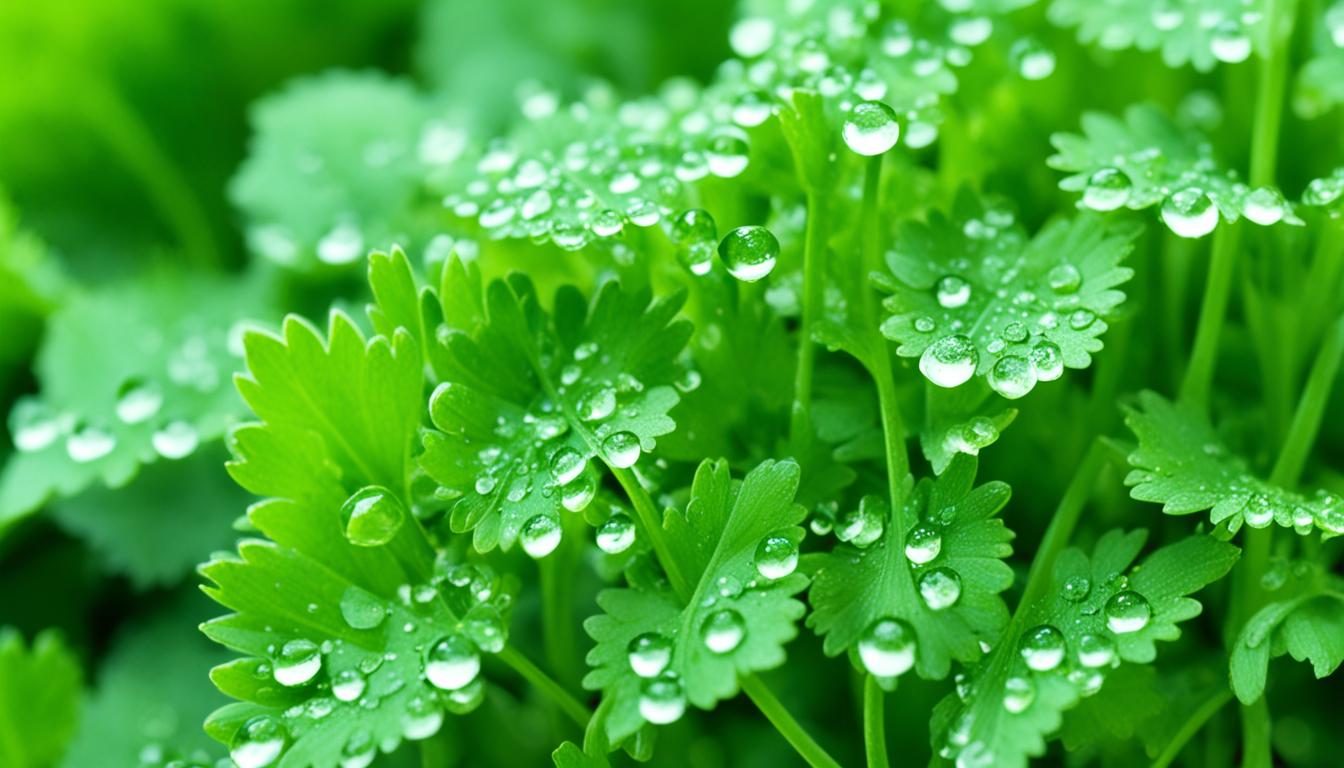Have you ever wondered about the incredible uses and benefits of coriander? From enhancing the flavor of your dishes to promoting your overall health, coriander offers a wide range of advantages that are worth exploring. Let’s delve into the world of this versatile herb and discover how it can elevate your cooking and well-being.
Key Takeaways
- Coriander, also known as cilantro, is a widely used herb and spice found in various cuisines.
- It is rich in essential vitamins, minerals, and antioxidants, making it beneficial for your health.
- Coriander can support blood clotting, bone health, and heart health.
- Its versatile flavor makes it a popular ingredient in cooking, adding depth and freshness to dishes.
- Whether you use coriander leaves or seeds, incorporating this herb into your diet is easy and rewarding.
Health Benefits of Coriander
The health benefits of coriander are impressive. It is loaded with essential nutrients and antioxidants that promote overall well-being. Coriander is a great source of vitamin K, which supports blood clotting and bone health. It also contains vitamin A and vitamin C, which are important for vision, immunity, and skin health.
The antioxidants in coriander help fight free radicals and reduce inflammation, potentially lowering the risk of chronic diseases. Coriander seeds have been shown to help lower blood sugar levels, making them beneficial for individuals with diabetes. Furthermore, coriander has been associated with improved heart health, as it acts as a diuretic and may help lower LDL (bad) cholesterol levels.
Its versatile nature makes it an excellent addition to a balanced diet. Whether you use coriander leaves or seeds, you can enjoy its unique flavor and reap its health benefits.
The Nutritional Composition of Coriander
| Nutrient | Amount per 100g |
|---|---|
| Energy | 23 kcal |
| Protein | 2.13 g |
| Fat | 0.52 g |
| Carbohydrate | 3.67 g |
| Fiber | 2.8 g |
| Sugar | 0.87 g |
| Calcium | 67 mg |
| Iron | 1.77 mg |
| Magnesium | 26 mg |
Coriander is a low-calorie herb that adds flavor and nutrition to your meals. It is also a good source of minerals like calcium, iron, and magnesium.
Including coriander in your diet can help you maintain a healthy lifestyle. Its nutritional composition and unique properties make it a valuable addition to any kitchen.
Culinary Uses of Coriander
Coriander is a versatile herb that adds a unique flavor and aroma to various dishes. Both the leaves and seeds of the coriander plant are used in cooking. The leaves, also known as cilantro, are commonly used in fresh salsas, salads, and as a garnish for curries and soups. They have a bright, citrusy flavor that pairs well with spicy and savory dishes.
The coriander seeds are typically used in powdered form or whole. They are commonly found in spice blends, curries, stews, and pickles. The seeds have a warm, earthy flavor that adds depth to dishes. Coriander is widely used in Indian, Middle Eastern, Mexican, and Asian cuisines. It can be used in both vegetarian and meat-based dishes, making it a versatile and essential ingredient in many recipes.
| Culinary Uses of Coriander | Examples |
|---|---|
| Use fresh coriander leaves as a garnish | Curry |
| Add coriander seeds to spice blends | Garam Masala |
| Include coriander in salad dressings | Cilantro-Lime Dressing |
| Use coriander leaves in salsas and chutneys | Tomato-Cilantro Salsa |
| Add coriander seeds to stews and soups | Spicy Lentil Soup |
How to Incorporate Coriander Into Your Diet
There are numerous ways to incorporate coriander into your diet and experience its unique flavor and health benefits. Fresh coriander leaves, also known as cilantro, can bring a fresh and vibrant taste to your dishes. Add them to salads, salsas, and soups for a burst of flavor, or use them as a garnish to enhance the presentation of various dishes.
Coriander seeds are another versatile option. They can be used whole or ground into a powder and are commonly found in spice blends, curries, and marinades. To enhance their aroma and flavor, consider toasting the seeds before using them in your cooking.
Coriander pairs well with a range of ingredients, such as cumin, garlic, ginger, and chili peppers. So, don’t hesitate to experiment with different flavor combinations. Whether you prefer the leaves or the seeds, coriander will elevate the taste of your dishes and add depth to your culinary creations.
